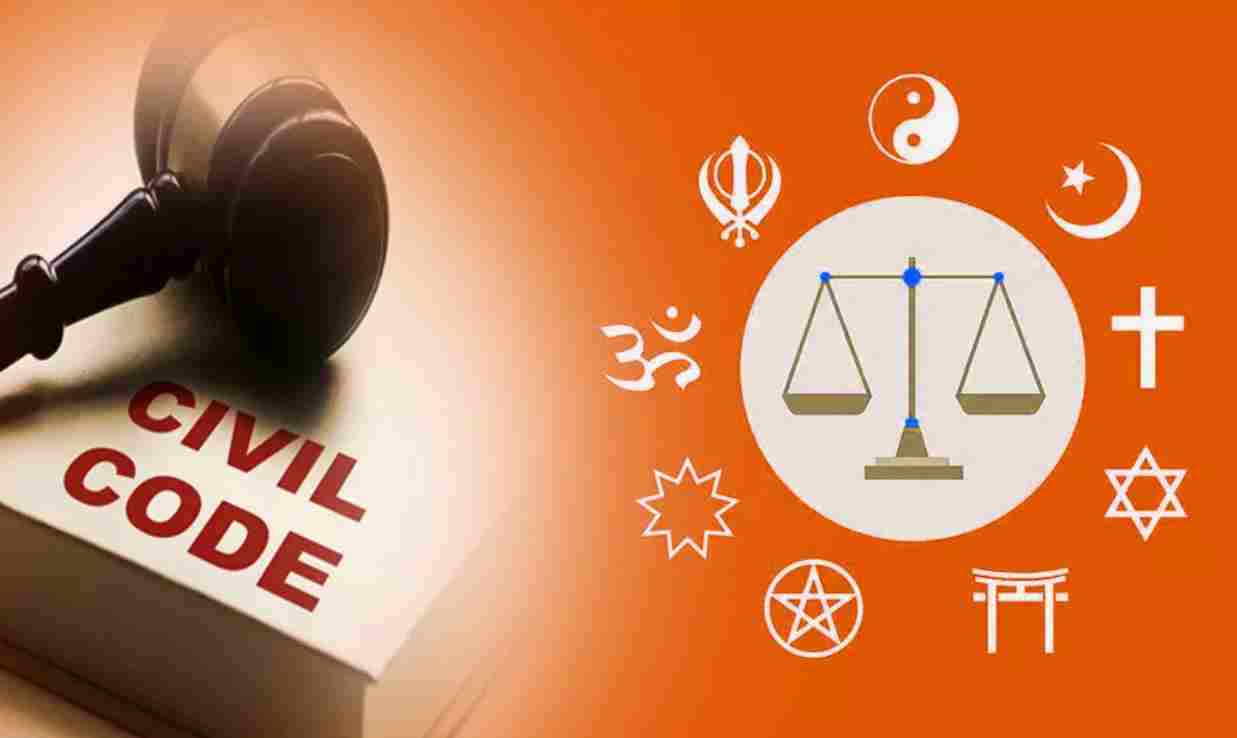Artcle:44- UCC-favour/Against/Way forward
About Uniform Civil Code (UCC)
- A UCC provides for the formulation of one law for the entire country, which would apply to all religious communities in their personal matters such as marriage, divorce, inheritance, adoption, and succession.

o Currently, Indian personal law is complex, with each religion adhering to its specific laws.
✓ For instance, Hindu Succession Act 1956 governs Hindus, Sikhs, Jains and Buddhists; Muslim Personal Law governs Muslims; and Indian Succession Act 1925 applies to Christians, Parsis, and Jews.
- Goa is the only place in India where a form of common civil code is in practice, the Portuguese Civil Code of 1867.

Arguments in favour of UCC
- Constitutional Mandate: Article 44 under Directive Principles of state policy.
- Promotes Secularism: Implementing a UCC would uphold the principles of a secular state, where religious beliefs do not dictate civil matters.

- National unity and integration: UCC would foster national unity by transcending religious and community divisions, promoting common citizenship, and creating a more unified legal system.
- Gender Justice: Promotes gender equality and women’s rights by eliminating discriminatory practices in certain religious personal laws.
o United Nations Human Rights Committee (UNHRC) has called on India to implement a UCC that would help India to demonstrate its commitment to the principles of equality and non- discrimination.
- Simplification of Laws: UCC will simplify the complex laws around marriage ceremonies, divorce, inheritance, succession etc.
o for example, individuals seeking a divorce would follow a standardized procedure, irrespective of their religious background, ensuring faster and more efficient resolution of disputes.
- Adapting to Modern Times: Implementing a UCC would enable the incorporation of modern principles and ensure that laws align with the evolving social landscape, promoting inclusivity and individual freedoms.
Arguments against UCC
- Against Diversity: Imposing a UCC could undermine the cultural and religious identities of different communities of the country and could violate religious freedom (Article 25 of the Constitution).
o Imposing a common civil code may dilute the unique rights and protections enjoyed by minority groups and erode their cultural autonomy.
- Lack of Consensus: Each community has traditions, customs, and religious laws they wish to preserve. Implementing a UCC without the consent and agreement of all communities could lead to social unrest.
- Federal Structure: Several experts argued that UCC could encroach upon states’ legislative competence, thereby infringing on principles of cooperative federalism.
o It is argued that states are better positioned to assess and legislate personal laws to suit their people’s needs, given their proximity to grassroots realities.
Also read: Why are regional political parties keen on a caste census
Also Read: SC upheld Abrogation of Article 370
Way forward for Adopting UCC for all
- Consensus: Government must engage in a constructive dialogue with all stakeholders, including religious leaders and community representatives.
- Strong Political Will: Government must ensure that the implementation of UCC is not used as a tool for political gains and that it is undertaken in a non-partisan and inclusive manner.
- Awareness: The common citizen must understand the rationale behind UCC and benefits. This will require a concerted effort by the government, civil society, and the media to sensitise the public on this issue.
- Eradicating discrimination: It is essential that UCC requires a thorough review of the existing personal laws to ensure that UCC is in line with the principles of justice, equality, and non-discrimination.
- Adopting a piecemeal approach: The goal of a UCC should ideally be reached in a piecemeal manner, like the recent amendment on the age of marriage. This could also pave the way for internal reform and change within the religious dispensation.
o Certain Indian laws already follow a uniform code in most civil matters – Indian Contract Act, Civil Procedure Code, Partnership Act, Evidence Act etc.
- Codification of all personal laws: By codifying laws, one can establish universal principles that promote fairness instead of enforcing A rigid uniform code, which may deter people from resorting to legal recourse, as marriage and divorce matters can be resolved through extrajudicial means.
